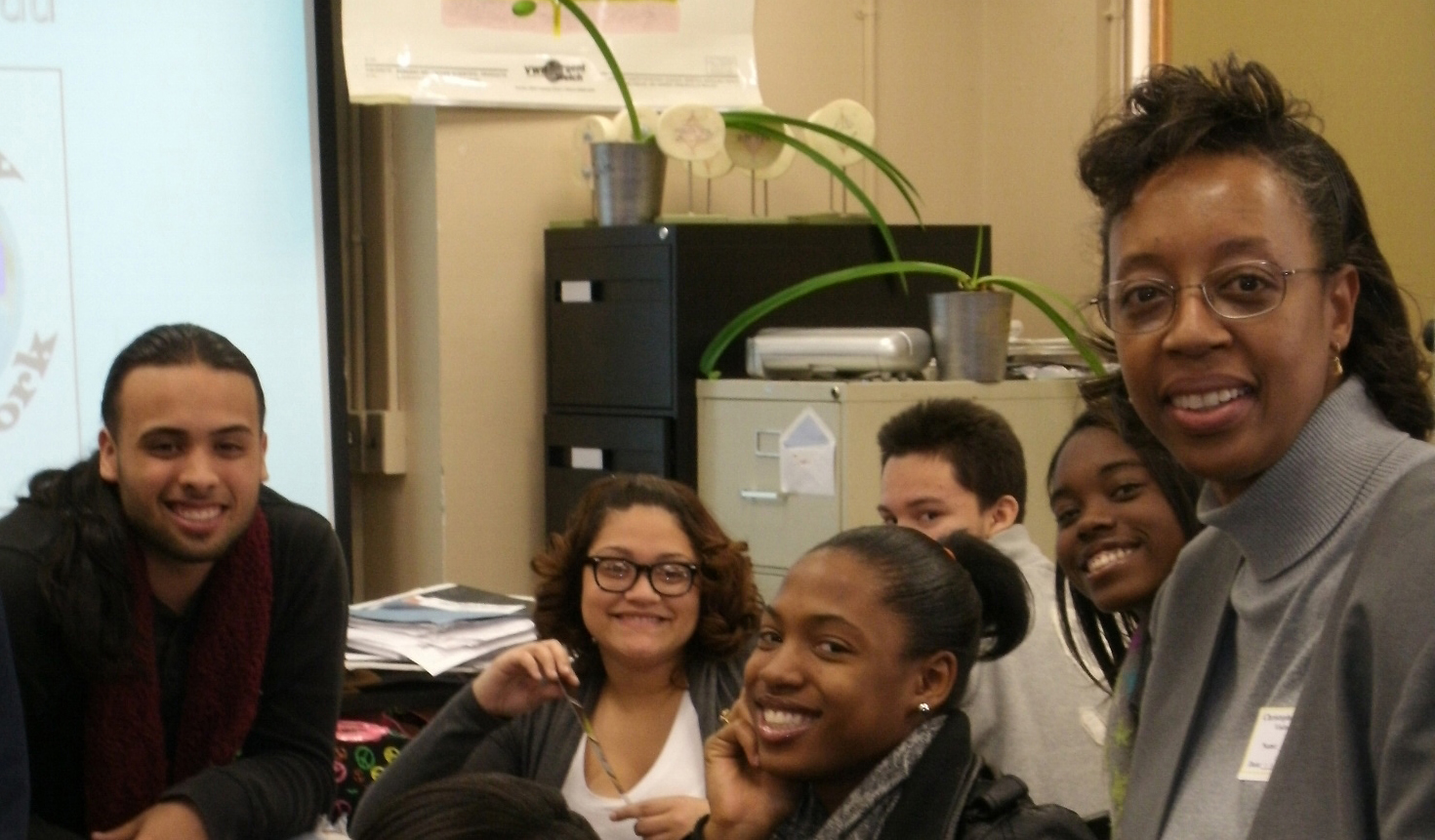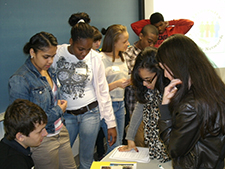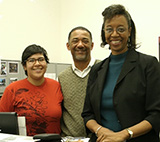UVM Activities
 Dr. Dupigny-Giroux visiting CIMS in the Bronx, New York
Dr. Dupigny-Giroux visiting CIMS in the Bronx, New York
In March 2011, Dr. Dupigny-Giroux spent a day visiting 10 classes at the Collegiate Institute for Math and Science (CIMS) in the Bronx, NY.
Students in these Physics, Chemistry and Genetics classes were primarily in grades 10 and 11. In introducing D-climNet, Dr. Dupigny-Giroux gave these students a mixture of a pep talk, and a glimpse into career opportunities in the climate sciences, the importance of mentoring, the need to be climate literate in today's world, and the science behind many common atmospheric phenomena.
 CIMS and Pelham Preparatory Academy students visit UVM
CIMS and Pelham Preparatory Academy students visit UVM
In April and May, students from CIMS, Pelham Preparatory Academy, and Christopher Columbus High School visited UVM to learn more about the university and the D-ClimNet program. Dr. Dupigny-Giroux also visited 9 classes at Burlington High School to talk to students about the program.
UGA Activities
D-climNet at UGA partnered with the Peach State Louis Stokes Alliance for Minority Participation (PSLSAMP) to query approximately 100 of its participants (via survey) on their understanding of climate-related science.
As noted on their website, "Peach State LSAMP is a National Science Foundation (NSF) sponsored program with the mission to significantly increase the number of underrepresented minorities pursuing degrees in Science, Technology, Engineering, and Mathematics (STEM)."
The alliance consists of five institutions, with the University of Georgia serving as the lead institution, Savannah State University, Ft. Valley State University, Southern Polytechnic State University, and Georgia Perimeter College.
 Dr. Franco Einaudi speaking in front of UGA D-ClimNet students
Dr. Franco Einaudi speaking in front of UGA D-ClimNet students
In conjunction with the UGA Initiative on Climate and Society, D-ClimNet invited former NASA GSFC Director of Earth Sciences, Dr. Franco Einaudi, to UGA campus in Fall 2010.
During this visit, Dr. Einaudi spoke to PSLSAMP about career opportunities in climate sciences at NASA.
UGA Principal Investigator Dr. Shepherd also lectured to a summer seminar led by PSLSAMP co-Investigator Michelle Cook.
This lecture introduced 12 new students to climate science and contemporary issues on the topic.
Dr. Shepherd spoke on climate science and career opportunities on June 21st, 2011 to the UGA Upward Bound Program.
The University of Georgia sponsors two Upward Bound Programs. The Northeast Georgia (NEGA) Program serves fifty-five eligible students from Banks, Jackson, and Wilkes Counties.
The University of Georgia (UGA) Program serves seventy-three eligible students from Clarke, Oglethorpe, and Madison Counties.
The need for such programs in this area is strong, due to the larger number of low-income and first generation students.
The proposed target area lies within a forty-mile radius of the University and is primarily populated by rural communities.
These programs will initiate services which will facilitate the removal of barriers to academic success and catapult participants into positive post secondary educational programs.
UCLA Activities
 D-ClimNet students at UCLA
D-ClimNet students at UCLA
At the University of California - Los Angeles, D-ClimNet students continue to excel as Geography majors. The graduating senior (pictured right) is now poised to continue his studies at the M.Sc. level, while the first year student (also pictured right) is a great ambassador for climate studies.
Co-PI Raphael works with Masai Minters of the Academic Advancement Program (AAP) to ensure that students are aware of the potential of the D-ClimNet program.
 Dr. Dupigny-Giroux and Masai Minters, Director - Communications & Evaluation of UCLA's Academic Advancement Program
Dr. Dupigny-Giroux and Masai Minters, Director - Communications & Evaluation of UCLA's Academic Advancement Program
UCLA's Academic Advancement Program (AAP) is the nation's largest university-based diversity program. The program encourages and promotes academic achievement and excellence by providing racially diverse students with "tutoring, academic programs, academic, personal, and career counseling, graduate mentoring, scholarships, research opportunities, and stipends, opportunities to participate in innovative science programs, and a computer lab."
What types of jobs do climate scientists and climatologists find?
- National Geographic Society
- Research Labs
- College/university professor
- Education and communication of climate and weather
- "Industry - companies or organizations that address environmental concerns or develop sources of energy using. People who have a background in weather and climate can help address environmental impact of buildings or other kinds of infrastructure developed by man. A background in this area would also be useful to someone who was interested in environmental law, or addressing environmental issues as part of the government."
- "State government in support of state climate change initiatives. ...departments like environmental quality, water/natural resources, and sometimes even agriculture... have been known to hire a scientist every now and then."
 Dr. Dupigny-Giroux visiting CIMS in the Bronx, New York
Dr. Dupigny-Giroux visiting CIMS in the Bronx, New York Dr. Dupigny-Giroux visiting CIMS in the Bronx, New York
Dr. Dupigny-Giroux visiting CIMS in the Bronx, New York CIMS and Pelham Preparatory Academy students visit UVM
CIMS and Pelham Preparatory Academy students visit UVM Dr. Franco Einaudi speaking in front of UGA D-ClimNet students
Dr. Franco Einaudi speaking in front of UGA D-ClimNet students D-ClimNet students at UCLA
D-ClimNet students at UCLA Dr. Dupigny-Giroux and Masai Minters, Director - Communications & Evaluation of UCLA's Academic Advancement Program
Dr. Dupigny-Giroux and Masai Minters, Director - Communications & Evaluation of UCLA's Academic Advancement Program